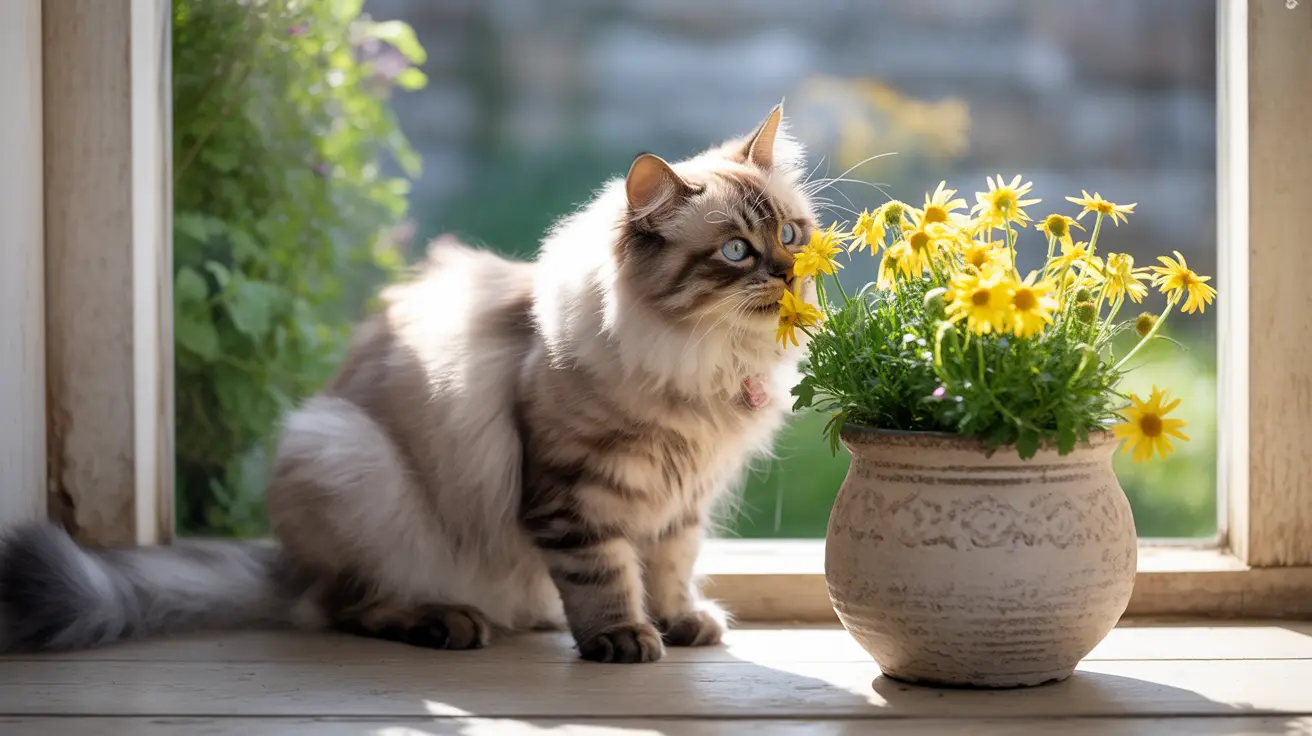If you're a cat owner who loves decorating with fresh flowers, you might be wondering: are daisies toxic to cats? The short answer is yes – many varieties of daisies can be toxic to our feline friends, though the severity of poisoning typically ranges from mild to moderate.
Understanding the risks associated with daisies and knowing how to protect your cat from potential poisoning is crucial for maintaining your pet's safety. Let's explore everything you need to know about daisy toxicity in cats and how to create a pet-safe environment.
Understanding Daisy Toxicity in Cats
Daisies belong to the Asteraceae family, which includes various species that can be harmful to cats. The main toxic compounds found in daisies are sesquiterpene lactones and pyrethrins, which can cause adverse reactions when ingested by cats.
While not usually life-threatening, these compounds can cause significant discomfort for your feline companion. The entire plant – including leaves, stems, flowers, and even pollen – contains these toxic substances.
Common Types of Toxic Daisies
Several daisy varieties pose risks to cats:
- Common daisies (Bellis perennis)
- Chrysanthemums (often called mums)
- Shasta daisies
- Gerbera daisies (though generally less toxic)
Recognizing Symptoms of Daisy Poisoning
If your cat has consumed daisies, watch for these common symptoms:
- Gastrointestinal issues (vomiting, diarrhea)
- Excessive drooling
- Skin irritation or dermatitis
- Loss of coordination
- Lethargy or weakness
- Loss of appetite
Immediate Actions if Your Cat Eats Daisies
If you suspect your cat has ingested daisies, take these steps:
- Remove any remaining plant material
- Monitor your cat's symptoms
- Contact your veterinarian immediately
- If possible, bring a sample of the plant to aid in identification
- Follow your vet's treatment recommendations
Prevention and Safe Alternatives
To protect your cat from daisy poisoning:
- Keep daisies and similar flowers out of reach
- Consider pet-safe alternatives like African violets or spider plants
- Create designated pet-safe garden areas
- Research all plants before bringing them into your home
- Use the ASPCA's toxic plant database as a reference
Treatment Options
Treatment for daisy poisoning typically involves:
- Induced vomiting (if recommended by a veterinarian)
- Administration of activated charcoal
- Fluid therapy to prevent dehydration
- Supportive care and symptom management
- Monitoring for complications
Frequently Asked Questions
Are all types of daisies toxic to cats or only specific varieties like chrysanthemums?
While all members of the daisy family (Asteraceae) can be toxic to cats, some varieties like chrysanthemums tend to be more dangerous than others. Gerbera daisies, for instance, typically cause milder symptoms but should still be kept away from cats.
What symptoms should I watch for if my cat eats daisies or similar flowers?
Key symptoms include vomiting, diarrhea, excessive drooling, skin irritation, and loss of coordination. In severe cases, cats may show signs of lethargy or significant gastrointestinal distress.
How dangerous is daisy poisoning in cats, and can it be life-threatening?
While daisy poisoning is usually mild to moderate, it can become serious if left untreated. Though rarely life-threatening, complications like dehydration can occur, especially if large quantities are consumed.
What steps should I take if I suspect my cat has ingested daisies?
Contact your veterinarian immediately, remove any remaining plant material, and monitor your cat's symptoms. If possible, bring a sample of the plant to help with identification and treatment planning.
What are some safe flower alternatives I can keep around cats instead of daisies?
Safe alternatives include African violets, spider plants, Boston ferns, and cat grass. Always verify plant safety using the ASPCA's toxic plant database before bringing new plants into your home.
Conclusion
While daisies can be toxic to cats, being informed and taking proper precautions can help keep your feline friend safe. Remember to always err on the side of caution, keep potentially harmful plants out of reach, and seek immediate veterinary care if you suspect your cat has ingested toxic flowers.






